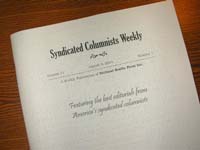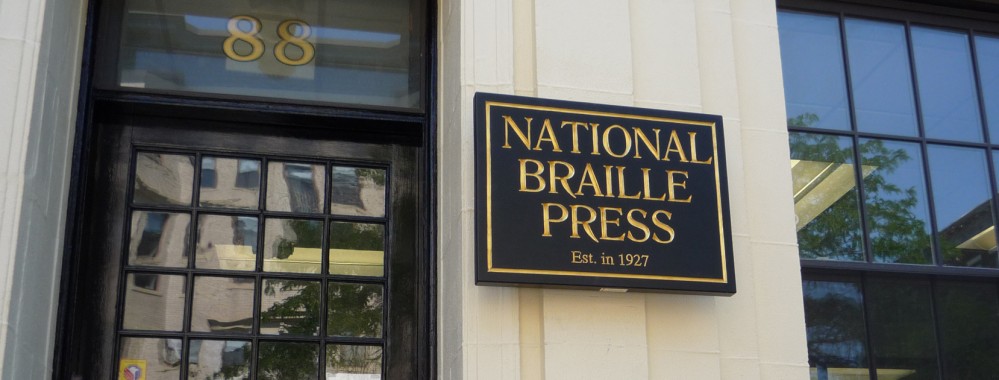I get my braille magazines from a deafblind friend who passes them on to me when she’s done reading them.  Then I read them while driving to work, eyes on the road, left hand on the wheel, right hand deep in Syndicated Columnists Weekly.
Then I read them while driving to work, eyes on the road, left hand on the wheel, right hand deep in Syndicated Columnists Weekly.
I’m sighted (you’re thinking: I hope so, if you drive a car!) and I think I may be the only person on the face of the planet who reads braille while driving 70 mph down the highway. Please don’t misunderstand me–I am not promoting distracted driving. I am simply stating a fact: I like to read braille while driving, which is no more dangerous than driving while listening to books on tape, or eating a pastrami sandwich on rye, or keeping time with my thumb on my knee to an old-fashioned song in my head, eyes on the road, EYES ON THE ROAD.
I’ve been intoxicated by braille ever since first learning to read it (visually) about 30 years ago when I worked as a transcriber at National Braille Press. Around that same time, I took a sign language class across the street at Northeastern University, where I fell in love with the teacher, who was deaf, and whom I later married. I also thereby became rather fluent in sign language, and eventually left NBP to pursue a career as an interpreter. But I never lost touch with braille. And eventually I learned to read it tactilely. This is how I did it:
I was sitting in the proverbial traffic jam from hell one day, going absolutely nowhere on my way to work, when I reached over to the passenger seat where there happened to be a braille letter from a deafblind friend I’d met the previous summer at an AADB (American Association of the DeafBlind) convention. With nothing better to do, I tried reading it with my finger. I had no problem with “Dear Paul,” but it took me the rest of my commute (about an hour) to make out the first two sentences. Concentrating on that braille letter in my lap, shifting it to my stomach, my chest, trying to read it with my finger, my eyes never leaving the road, made the time go by. And it was something to DO. And so, on the drive home, I continued reading. And the next day and the next. And lo, my habit of reading braille in the car was born!
If you do anything for two hours a day (an hour in, and an hour out) five days a week, for several years, you will get better at it. Which is exactly what happened. I can now read braille quite proficiently with my right index finger. And I enjoy doing it! I like the physicality of reading tactilely. Am I using neurons and synapses that I wouldn’t otherwise be using? I don’t know, and I don’t really care about the science of it; what interests me more is, for lack of a better word, the poetry of braille. For example, a long time ago at NBP, my friend Gil Busch told me the word “ice” in braille always reminded him of a little hill: the upward climbing i, the crest of the c, the downward sloping e. I never forgot that, and I always think of it when I come across that word in my reading. And my friend John Lee Clark has said, Andy is a square; Sandy is a square with a ponytail. Such are the little reading pleasures that are peculiar to braille. All those words within words. And those lower-cell contractions (BY, TO, INTO) that, before UEB, would attach to the subsequent character, kind of like a barnacle, or a burr, or a baby sloth. And the tactile alliteration of a string of dot 5 contractions all in a row: “Lord knows, some young mothers work right here throughout the day.” Or encountering the occasional sentence or phrase made up entirely of whole-word contractions: “You can do as you like but it’s just that people like us will not go.” Call me weird, but I get a kick out of these sorts of things when I encounter them in my reading.
I enjoy reading braille in bed at night when my wife would rather go to sleep. No problem, honey, I’ll read with the lights out. I enjoy reading braille in a dark movie theater during those interminable previews, and even during the movie itself if it turns out the movie stinks. I read braille in line at the bank, in line at the grocery store, while waiting for the train, while riding on the train, and even while walking from the train (walking and reading is easy as walking and talking!). But most of all I enjoy (see above) reading braille while driving–driving while intoxicated by braille! I think I hear some of you object: But it must be illegal! Let me reassure you, our esteemed lawmakers and constabularies can’t even conceive of it. No one can imagine it–no one except you, that is. So it’s our little secret. Okay?


